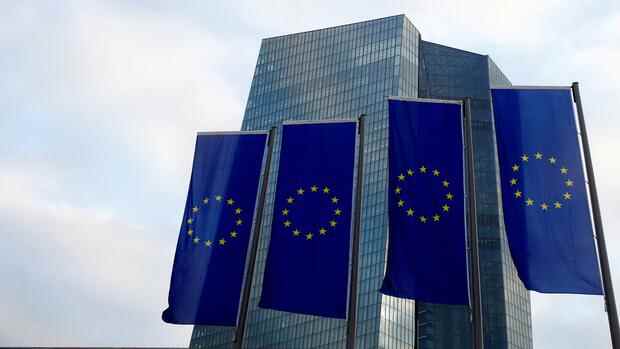With its decision, the central bank is initiating the exit from the loose monetary policy.
(Photo: Reuters)
Frankfurt, Düsseldorf The European Central Bank (ECB) will expire its PEPP purchase program, which was launched during the pandemic, at the end of March 2022. The central bank announced on Thursday.
The older APP bond purchase program, on the other hand, is to be increased from currently 20 to 40 billion euros per month from April in order to prevent purchases from being abruptly abandoned. From July the purchases will then be reduced to 30 billion euros, from October to 20 billion euros and then retained for as long as is necessary to stimulate the economy.
In addition, the ECB decided to make replacement investments in the PEPP program more flexible. Even if the ECB no longer buys additional bonds through PEPP, it will keep the current bond portfolio in this program constant until the end of 2024 by replacing expiring paper. She wants to use these replacement investments flexibly.
The ECB has no prospect of an end to the APP program. Since this is a prerequisite for interest rate hikes, higher rates in the coming year appear unlikely. As part of the APP program, which has been in use since 2015, the ECB has so far invested more than three trillion euros in government bonds and corporate papers.
Top jobs of the day
Find the best jobs now and
be notified by email.
Nevertheless, with its decision today, the ECB is initiating an exit from its loose monetary policy. In doing so, it is reacting to the recent sharp rise in inflation. In the euro area this reached 4.9 percent in November. This is the highest value since the beginning of monetary union.
The ECB attributes the significant increase primarily to special effects from the pandemic. However, central bank chief Christine Lagarde recently admitted that inflation could remain high for longer than initially expected. Many economists expect inflation to remain above the ECB’s target of two percent next year. Central bank chief Christine Lagarde will present new inflation forecasts by the ECB up to 2024 at her press conference.
More about central banks:
The surge in inflation this year is a global phenomenon to which central banks react differently. The US Federal Reserve initiated the turnaround in monetary policy at the beginning of November and decided to gradually reduce its bond purchases. On Wednesday she decided to accelerate this process so that the net purchases there will be over in the spring. The Bank of England decided at its meeting on Thursday to raise the key rate from 0.1 to 0.25 percent.
The ECB, on the other hand, left the deposit rate at the previous level of minus 0.5 percent. Banks must therefore continue to pay penalty interest if they park excess funds with the European Central Bank (ECB). As expected, the key interest rate will remain at zero percent. The interest rate has been at this level since March 2016.
This is how economists judge the ECB decision
Frederik Ducrozet, analyst at the Swiss asset manager Pictet, sees the decision as a little more relaxed than expected. He sees it as a surprise that the ECB has not given a specific end date for the APP bond program. “This is a big surprise and a great success for the pigeons,” he writes on Twitter alluding to the supporters of loose monetary policy.
Critics accuse the ECB of using all the cheap money to fuel inflation, which it actually wants to keep in check. “The decisions of the ECB are at best a minor correction to a policy that is still very expansive,” explains Michael Heise, chief economist at HQ Trust. “This is not expected to have any dampening effects on the inflation rate.”
The central bank’s primary goal is stable prices with an inflation rate of two percent. Higher inflation weakens the purchasing power of consumers because they can then buy less for one euro than before.
More: Will inflation stay high? These eight graphics show the arguments for and against
